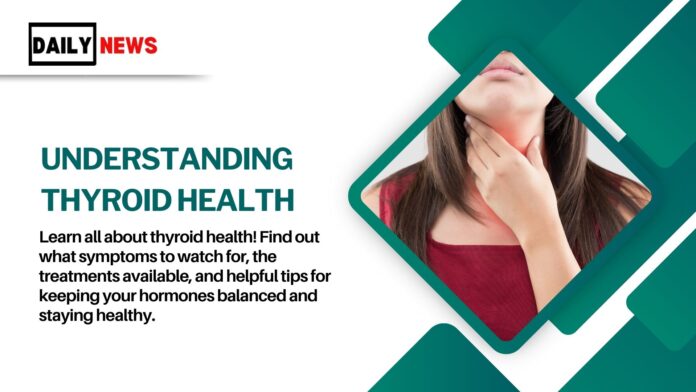The thyroid gland, a small but vital organ located at the base of the neck, plays a significant role in maintaining the body’s overall health. This butterfly-shaped gland produces hormones that regulate metabolism, energy levels, and many other bodily functions. Understanding thyroid health is essential for identifying potential disorders early and managing them effectively.
What is the Thyroid Gland and How Does it Work?
The thyroid gland is part of the endocrine system and is responsible for producing two main hormones: thyroxine (T4) and triiodothyronine (T3). These hormones influence almost every cell in the body, impacting critical processes such as:
- Metabolism: How the body converts food into energy.
- Heart Rate: Maintaining normal cardiovascular functions.
- Growth and Development: Especially crucial during childhood and adolescence.
The production and release of thyroid hormones are controlled by the hypothalamus and pituitary gland, forming a feedback loop called the hypothalamic-pituitary-thyroid axis.
Common Thyroid Disorders
1. Hypothyroidism (Underactive Thyroid)
Hypothyroidism occurs when the thyroid gland produces insufficient hormones. Symptoms can vary but often include:
- Fatigue and Weakness: A common sign of slowed metabolism.
- Weight Gain: Despite no changes in appetite or diet.
- Cold Sensitivity: Feeling cold more often than usual.
- Depression: Due to hormonal imbalances.
- Dry Skin and Hair Loss: Related to slower cell turnover.
Causes of Hypothyroidism
- Hashimoto’s Thyroiditis: An autoimmune condition.
- Iodine Deficiency: Essential for hormone production.
- Thyroid Surgery or Radiation Therapy: Can reduce gland function.
2. Hyperthyroidism (Overactive Thyroid)
Hyperthyroidism results from excessive hormone production. Its symptoms include:
- Rapid Weight Loss: Despite an increased appetite.
- Heat Intolerance: Feeling excessively warm.
- Heart Palpitations and Anxiety: Due to heightened metabolic activity.
- Increased Sweating and Tremors: A hallmark of hyperthyroidism.
Causes of Hyperthyroidism
- Graves’ Disease: An autoimmune disorder.
- Thyroid Nodules: Overactive tissue growths on the gland.
- Excessive Iodine Intake: Through diet or medications.
3. Goiter
A goiter is an abnormal enlargement of the thyroid gland. It can result from:
- Iodine Deficiency: A primary global cause.
- Thyroiditis: Inflammation of the gland.
- Autoimmune Disorders: Such as Graves’ or Hashimoto’s.
4. Thyroid Nodules and Cancer
Thyroid nodules are lumps that can form within the gland. While most are benign, some may lead to thyroid cancer. Symptoms include:
- Difficulty Swallowing or Breathing: Due to gland enlargement.
- Persistent Hoarseness: A possible sign of vocal cord involvement.
- Lump in the Neck: Visible or palpable.
Diagnosis of Thyroid Conditions
Accurate diagnosis is critical for effective treatment. Common diagnostic methods include:
- Blood Tests: Measuring TSH (thyroid-stimulating hormone), T3, and T4 levels.
- Imaging Tests: Ultrasound or radioactive iodine uptake scans.
- Biopsy: Fine-needle aspiration to evaluate nodules for cancer.
Treatment Options for Thyroid Disorders
Medications
- Levothyroxine: A synthetic hormone for hypothyroidism.
- Antithyroid Drugs: Such as methimazole for hyperthyroidism.
Radioactive Iodine Therapy
Used to shrink overactive thyroid tissue, particularly in hyperthyroidism.
Surgery
Thyroidectomy (partial or total removal of the thyroid) may be necessary for severe cases, such as large goiters or cancer.
Lifestyle Adjustments
- Balanced Diet: Including iodine-rich foods like seafood and iodized salt.
- Regular Exercise: To maintain a healthy metabolism.
- Stress Management: Chronic stress can exacerbate thyroid issues.
Preventing Thyroid Disorders
While some thyroid issues are genetic or autoimmune, certain measures can help reduce risk:
- Adequate Iodine Intake: Avoiding both deficiency and excess.
- Regular Screenings: Especially for those with a family history.
- Healthy Lifestyle Choices: Managing weight, reducing stress, and eating a nutritious diet.
When to See a Doctor
Seek medical attention if you experience persistent symptoms like fatigue, weight changes, or neck swelling. Early diagnosis can prevent complications such as cardiovascular issues, infertility, or osteoporosis linked to untreated thyroid disorders.

Er. Rishav Raj (Btech Computer Science)
Dr. Rishav Raj (Bachelor of Ayurvedic medicine and Surgery)
I am a professional blogger since 12 years worked for different healthcare blog as well as health care advisor for different multinational companies as well as Software developer for different healthcare and technology based software.i am here to share you some informative blog regarding news , healthcare and technology







